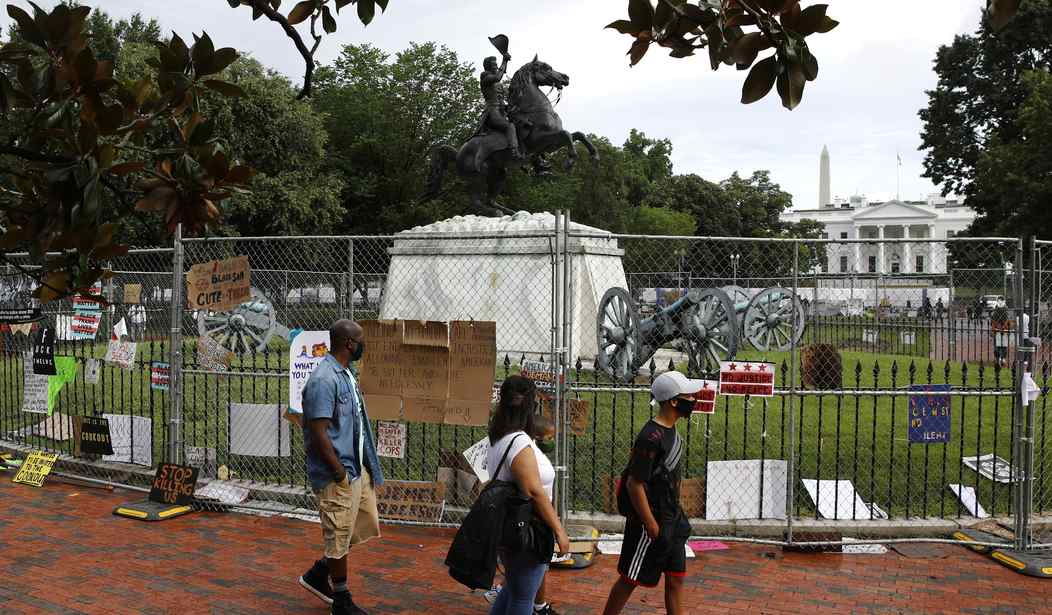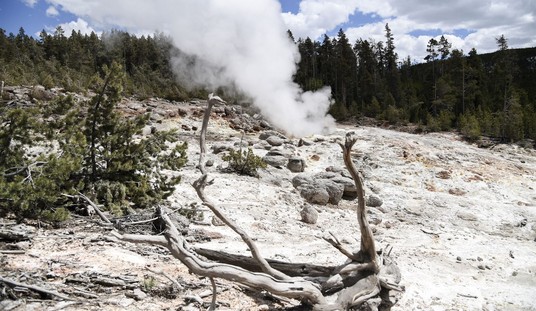On June 27, 2020, the US Attorney’s Office for the District of Columbia filed a criminal complaint in connection with the June 22 effort by Antifa/BLM agitators to take down the statue of Pres. Andrew Jackson in Lafayette Park across from the White House. The park is federal property, and those involved were charged with “destruction of federal property,” a violation of 18 USC Sec. 1361, and if the damage to the federal property is greater than $1000, it is a felony which carries a maximum term of imprisonment of up to 10 years.
Four individuals were named in the original complaint — Lee Michael Cantrell, 47, of Virginia; Connor Matthew Judd, 20, of Washington, D.C.; Ryan Lane, 37, of Maryland; and Graham Lloyd, 37, of Maine. The complaint described the various conduct of each of the four, but none were identified as being a “ringleader” or otherwise described as an organizer of the effort. Graham Lloyd turned himself in to authorities in Portland, Maine last week, made an initial appearance in federal court there, and his case is now being transferred to Washington DC where he will face trial.
Connor Judd is a student at George Washington University in Washington DC. He was arrested Sunday, made an appearance in federal court in DC on Monday and was released.
This morning the FBI announced the arrest of Jason Charter, who they did describe as a “ringleader” of the effort, and his conduct is said to have included climbing to the top of statue and directing others where to attach the ropes in an effort to pull it down. Chandler was not named in the original complaint, but now faces charges along with the others. He is scheduled to make a court appearance on Thursday, and the criminal complaint against him will likely be unsealed at that time.
Charter was also involved in assault and battery on conservative commentator Jack Prosobiec near the park on June 26. That incident was captured on video.
Assault, battery & attempted robberty commited by antifa/blm on @OANN's reporter @JackPosobiec in DC
earlier this evening.Clip courtesy of @BreitbartNews edited by moi .. God Blesshttps://t.co/qXrO1MgGg8 pic.twitter.com/QLYiDCks0c
— wlctv.ca (@wlctv_ca) June 27, 2020
Prosobiec had to be escorted away to safety by the security team for a network news crew.
Charter is active on Twitter @JasonRCharter, and his timeline is full of Antifa/BLM protest activity, slogans, and various other demonstrations of support for the “cause.” He describes himself as a “political activist/organizer”. Soon he may be able to add “convicted felon” to his list of accomplishments.
A “criminal complaint” in federal court is a “placeholder” charging document. It is issued based on an affidavit submitted by a law enforcement agent, and an arrest warrant for the person(s) named in the complaint is issued at the same time by the Judge who signs the complaint. The federal prosecutors who secured the complaint have 14 days following an arrest based on a complaint to obtain an indictment from a federal grand jury which then initiates the formal process of prosecuting the individual on a federal crime. The indictment can include charges not made in the criminal complaint so there is no way to predict at this point exactly what crimes the defendants will be charged with by the grand jury.
An “initial appearance” on a criminal complaint has three basic purposes — 1) to advise the defendant of the charges filed against him and the potential penalties that attach to those charges; 2) to insure that the defendant is represented by counsel, either a retained attorney or an attorney appointed by the court for those who cannot afford and attorney; and 3) a bail hearing to determine if the person arrested should be detained or released on conditions of “supervised release” while the matter is pending before the Court.














Join the conversation as a VIP Member